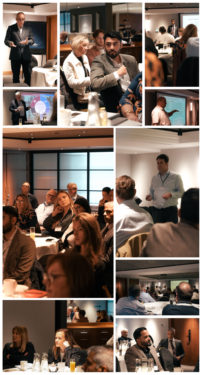A great event with the Utilities sector in Manchester, sponsored by Mega.AI, discussing affordability, vulnerability and alignment across the sector. Some really super insights.
Some notes from the session below.

Key Take Aways
- Cross-sector collaboration is essential to improve financial resilience and vulnerability support across utilities, financial services, and government.
- There are approximately 7 million UK households not claiming entitled welfare benefits and grants.
- Data sharing between regulators and firms remains fragmented, slowing progress in identifying and supporting vulnerable customers.
- A unified definition and lexicon of vulnerability across sectors would enhance coordination and best practice sharing.
- Personalised, data-led interventions are needed to move beyond identifying vulnerable customers toward delivering meaningful, sustainable support.
- Social tariffs and debt relief schemes can significantly improve affordability for customers in financial distress.
- AI and predictive modelling are increasingly used to identify hidden vulnerabilities and support customers proactively.
- Auto-enrolment pilots, such as the Thames Water and Policy in Practice initiative, demonstrate measurable impacts on customer outcomes.
- Regulators, including Ofwat, Ofgem, and the FCA, are pushing for smarter data use and consumer duty alignment.
- There is growing recognition that vulnerability management must include health, social, and financial factors together.
- Trust and engagement are key barriers; customers need transparency about how their data is used.
- Political and regulatory coordination is lacking, with calls for a joined-up government approach to financial resilience.
Innovation
- Cross-sector data integration between local authorities and utilities for automatic benefit and tariff entitlement matching.
- AI-driven vulnerability identification through real-time monitoring of energy and gas consumption.
- Predictive modelling to flag financial hardship and behavioural patterns indicating hidden needs (w/ Capgemini)
- Generative AI applications delivering empathetic, personalised communication to vulnerable customers.
- “If Amazon did vulnerability” concept – focusing on personalisation and customer-centric design in support delivery.
- Capgemini’s machine-learning tools to detect usage anomalies and forecast vulnerability.
- Policy and Practice’s data-matching system enabling automatic customer enrolment in social tariffs.
Key Statistics
- 7 million UK households not claiming entitled welfare benefits and grants.
- £24 billion in unclaimed national support, including £750 million in the water sector.
- Water bills set to rise by £133, increasing pressure on low-income households.
- 600,000 more households expected to need social tariffs (37% increase).
- Auto-enrolment pilot delivered £6.5 million in support to 15,000 customers across 18 local authorities.
- National goal to reach 50% of vulnerable consumers via Priority Services Register (PSR), current levels around 17–20%.
- StepChange data shows 50% of problem debt cases involve multiple vulnerabilities.
- Policy and Practice project aims to save 33,000 customers £10 million annually.
Key Discussion Points
- The urgency of coordinated regulatory action across financial, water, and energy sectors.
- The need for consistent vulnerability definitions and red flags across industries.
- How AI and smart data can bridge gaps in identifying and supporting at-risk consumers.
- The ethics of data use, customer consent, and transparency under GDPR.
- Challenges of implementing nationwide social tariffs given differing regional thresholds.
- Role of AI governance and accountability in board-level decision-making.
- Importance of consumer engagement in assessing risk tolerance and designing support.
- How social prescribing partnerships can connect NHS services with financial support networks.
- Use of predictive analytics to identify non-traditional vulnerability signals in energy usage.
- The benefits and risks of auto-enrolment approaches in tackling low uptake of benefits.
- How financial resilience strategies must integrate debt, health, and social policy.
- Cultural and political barriers to achieving joined-up regulation and coordinated government strategy.
Description
This event brought together industry leaders, regulators, and innovators to discuss how data, technology, and collaboration can transform support for financially vulnerable customers.
It explored how cross-sector partnerships, AI, and automated data sharing can deliver fairer, more personalised outcomes.
Key themes included financial resilience, smart data use, regulatory expectations, social tariffs, and the integration of social, health, and financial support systems to create sustainable, joined-up solutions.
RO-AR insider newsletter
Receive notifications of new RO-AR content notifications: Also subscribe here - unsubscribe anytime

